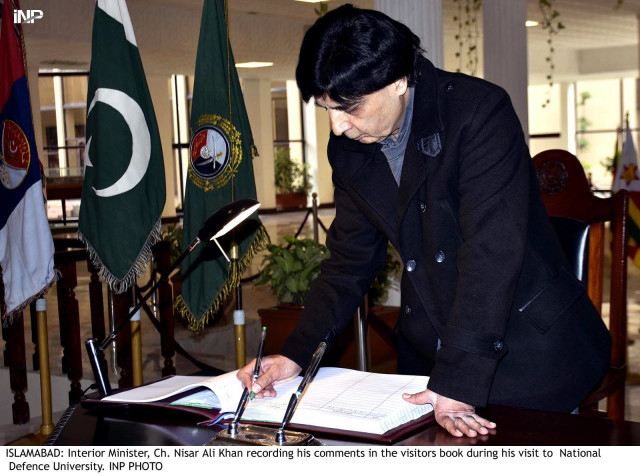Depts asked to consult AGP before hiring private counsels
Experts say amendments may again be challenged in top court

Interior Minister Ch. Nisar Ali Khan recording his comments. PHOTO: INO
A senior official told The Express Tribune that the law ministry has amended the rules, wherein the said ministry prior to its approval of any department's plea regarding the engagement of private counsel will consult the AGP.
He said that amendments have been made following the issuance of the Supreme Court's February 8 verdict, authored by Justice Qazi Faez Isa who took strong exception to the practice of the federal and provincial departments for hiring private attorneys in different cases and paying them a huge sum in legal fees from the national exchequer.
The official said that the federal government has decided to withdraw its review petition against the judgment after amendment in the rules of business by the ministry.
Private counsel refuses to represent Sindh govt in CM advisers case
He pointed out that the SC, in its paragraph 23 of the judgment, observed that the government may amend the rules for engaging private counsel.
However, legal experts say that amendments in the rules may again be challenged in the top court on several grounds.
Firstly, the judgment is based on an interpretation of Articles 100 and 140 of the Constitution and the Central Law Officers Ordinance, 1970, as well as laws relating to provincial law officers. Therefore, amendments in the rules wouldn't allow the government to engage private counsels.
In its verdict the Supreme Court had regretted that the governments persist to engage private advocates for no justifiable reason - a practice that must now stop.
It also directed its office to send a copy of the judgment to the AGP and all provincial advocates general, establishment division secretary, chief secretaries, law secretaries and finance secretaries for their perusal and compliance.
Authoring the written judgment, Justice Isa established that if the governments did not follow the order before engaging a private advocate, then any statement made before a court or comments or written statement that are filed would not be binding on the government concerned.
If a government contends that none among its law officers are capable of handling cases, then the question arises as to why incompetent persons were appointed. In such a scenario, the masses suffer twice. Firstly, by paying incompetent law officers and secondly, paying again for the services of a competent counsel that the government engages.
Waste of money: Top court objects to hiring of private attorneys
Later, challenging the Supreme Court's recent judgment barring its departments from hiring the services of private attorneys, the federal government told the Supreme Court that the state will suffer irreparable and ultimate loss due to the restriction.
The government, in the review petition, contended that the engagement of private counsel may not be prohibited nor made conditional upon certification by the law officers.
It stated that it is a matter of record that the government is a larger litigant before the courts of law. The number of cases in the high courts, Supreme Court and the law officers following the cases in the wake of the restriction would make the state suffer irreparably.
Sources said the government had filed a review petition against the verdict on the recommendation of Interior Minister Chaudhry Nisar as senior lawyer Makhdoom Ali Khan recused himself from representing the ministry in a suo motu case relating to the Quetta blast in August last year.
Currently, a total of 146 federal law officers are serving across the country.
Published in The Express Tribune, March 14th, 2017.



















COMMENTS
Comments are moderated and generally will be posted if they are on-topic and not abusive.
For more information, please see our Comments FAQ